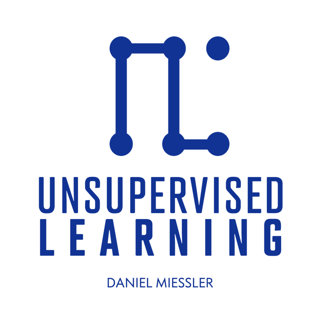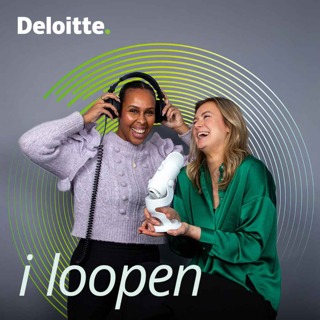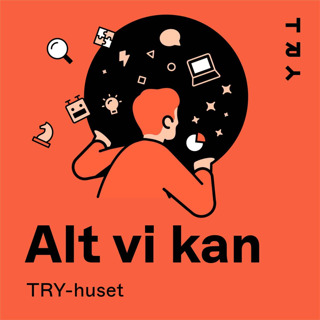
Unsupervised Learning: No. 191
Protestors in Hong Kong are physically attacking and destroying facial recognition cameras. MorePalo Alto says 7 out of 10 new domain registrations (NDRs) are either malicious or not safe for work, and they encourage companies to block them. MoreLt. Gen. Fogarty is fighting to change the name of Army Cyber Command to Army Information Warfare Command, and to give the group a much larger scope in its mission. MoreWe continue to see attacks against open source supply chains, in packages like NPM, RubyGems, Webmin, and many others. It's about to become imperative for people to understand—and to be able to validate—the entire chain of trust that a given application sits upon before they use it. There have been many companies in this space in the past, but I expect to see them (and new players) get a lot more attention soon. MoreBecome a Member: https://danielmiessler.com/upgradeSee omnystudio.com/listener for privacy information.
26 Aug 201925min

The Difference Between Data, Information, and Intelligence
The terms intelligence, information, and data are thrown around pretty loosely in most tech circles, and this inevitably leads to people confusing and/or conflating them. What follows is a simple explanation of how the related terms are different from each other, and how they work together.Become a Member: https://danielmiessler.com/upgradeSee omnystudio.com/listener for privacy information.
19 Aug 20195min

Unsupervised Learning: No. 190
There are some seriously nasty Windows RDP bugs out there. If you have RDP facing the internet, make sure you're patched. And try to get to VPN as soon as possible. MoreA huge survey of firmware security has found virtually no improvement over the last 15 years. People seem surprised by this, but it is exactly what I would have predicted based on my analysis here. Basically, for most people not in the industry, our current state is actually fine. MoreNYPD has over 82K peoples' DNA in a database, and the program has little visibility and oversight. MoreBecome a Member: https://danielmiessler.com/upgradeSee omnystudio.com/listener for privacy information.
19 Aug 201922min

Unsupervised Learning: No. 189
Ring is developing two-way relationships with hundreds of police departments in the US. This allows Ring users to be alerted to crime in their area via 911 data, and police departments to pull video from participating Ring devices. This is the type of functionality that most people will see and think, “Wow, I'd love to have that!”, which is why it's going to be very successful. But it's also one tiny step away from something terrifying. MoreA number of critical bugs in VxWorks are going to cause issues with infrastructure for years to come. MoreDARPA is building a $10 million dollar, open source voting system with a focus on security. MoreIt looks like China's social credit system might not be a giant monolithic system, but rather a series of siloed experiments. MoreBecome a Member: https://danielmiessler.com/upgradeSee omnystudio.com/listener for privacy information.
13 Aug 20198min

Unsupervised Learning: No. 188
Marcus Hutchins got off with time-served, and people have feelings. The range basically goes from 'he did nothing wrong', to, 'he should rot in prison'. In my mind this outcome was close to perfect. Remember, he went through two years of hell since being brought up charges, he's still a convicted felon, and he also is largely banned from the US. I think it's good that he admitted guilt, faced consequences, and is being offered a chance to continue giving back to the community. MoreAttorney General Barr said recently that companies should put backdoors in their products that bypass encryption, or else the government will pass laws that require it. This is unspeakably stupid. Without even getting into the philosophy of whether the internet can host a private conversation (which requires a warrant to tap), we can just start with the fact that backdoors present a clear and present danger to security, right now, due to the weaknesses of those who create them. If the NSA can be hacked or somehow lose its sensitive tools and materials, there's no company this cannot happen to. Purposefully installing backdoors therefore equates (effectively) to giving such access to attackers. Unacceptable. MoreEquifax is offering people $125 dollars in reparations for them losing all your data. But to get it, you have to log in and give a bunch of data about yourself. It's hilarious. They made money offering credit protection after the breach, and now they're going to collect updated information on anyone who wants to collect $125. On Twitter I called this a sadder and more permanent form of giving plasma. MoreBecome a Member: https://danielmiessler.com/upgradeSee omnystudio.com/listener for privacy information.
29 Jul 201919min

Humans Are Genebots
Unpacking the evolution-granted bliss of prep schools and elite institutions, and why they resonate so much with us.Become a Member: https://danielmiessler.com/upgradeSee omnystudio.com/listener for privacy information.
26 Jul 20197min

Machine Learning Doesn’t Introduce Unfairness—It Reveals It
The difference between unfairness and bias in machine learning.Become a Member: https://danielmiessler.com/upgradeSee omnystudio.com/listener for privacy information.
25 Jul 20198min

Unsupervised Learning: No. 187
Lots of people in the security community went silly over the FaceApp application last week, basically saying that you shouldn't be using the application because they'll steal your face and then be able to impersonate you. Oh, and then it turned out to be a Russian company who put out the application, and that made it 100x worse. The problem here is the lack of Threat Model Thinking. When it comes to election security, propaganda discussions, etc., I am quite concerned about Putin's willingness and ability to harm our country's cohesion through memes and social media. But that does not extend to some random company stealing faces. Why? Because before you can get legitimately concerned about something, you have to be able to describe a threat scenario in which that thing becomes dangerous. As I talked about in this piece, pictures of your face are not the same as your face when it comes to biometric authentication. There's a reason companies need a specific device, combined with their custom algorithm, in order to enroll you in a facial identification system. They scan you in a very specific way and then store your data (which is just a representation, not your actual face) in a very specific way. Then they need to use that same exact system to scan you again, so they can compare the two representations to each other. That isn't happening with random apps that have pictures of you. And even if that were the case, they could just get your face off your social media, where those same people who are worried are more than happy to take selfies, put their pictures on profile pictures, and make sure as many people see them as possible. There are actual negative things that can be done with images (like making Deepfakes of you), and that will get easier over time, but the defense for that is to have zero pictures of you…anywhere. And once again you have to ask who would be doing that to you, and why. Bottom line: authentication systems take special effort to try to ensure that the input given is the same as the enrollment item, e.g., (face, fingerprint, etc.), so it will not be easy any time soon to go from a random picture to something that can full a face scanner or fingerprint reader at the airport. People reading this probably already know this, but spread the word: threat modeling is one of our best tools for removing emotion from risk management. A contractor named SyTech that does work with Russian FSB has been breached, resulting in the release of 7.5TB of data on the FSB's various projects. This is obviously embarrassing for SyTech and the FSB, but the leaked projects focused on de-anonymization, spying on Russian businesses, and the project to break Russia away from the Internet, which are all known and expected efforts. So there don't seem to be any big reveals as a result of the leak. MoreSomeone discovered that a bunch of browser extensions were reading things they shouldn't be, and sending them out to places they shouldn't be. This is not surprising to me. Chrome extensions are like Android apps, which should tell you all you need to know about installing random ones that seem interesting. My policy on browser extensions is extremely strict for this reason. People need to understand how insane the entire idea of the modern web is. We're visiting URLs that are executing code on our machines. And not just code from that website, but code from thousands of other websites in an average browsing session. It's a garbage fire. And the only defense really is to question how much you trust your browser, your operating system, and the original site you're visiting. But even then you're still exposing yourself to significant and continuously-evolving risk when you run around clicking things online. And the worst possible thing you can do in this situation is install more functionality, which gives more parties, more access, to that giant stack of assumptions you're making just by using a web browser. The best possible stance is to have as few people possible with access to your particular dumpster. And that means installing as few highly-vetted add-ons as possible. MoreBecome a Member: https://danielmiessler.com/upgradeSee omnystudio.com/listener for privacy information.
22 Jul 201935min





















